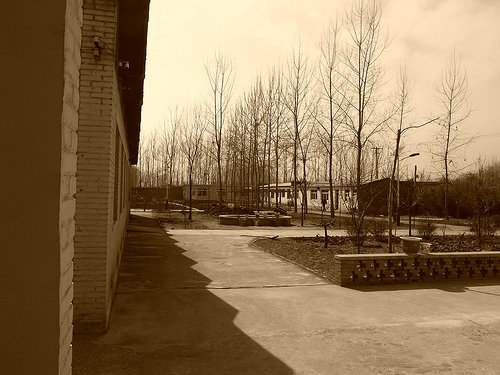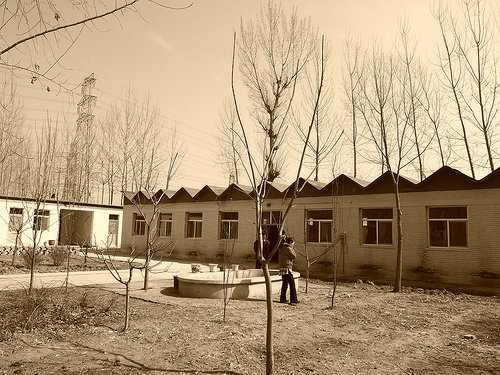http://www.hongniba.com.cn/bookclub/images/books/book_10005630_b.jpg
Cover of “A Garden of Green Vegetables Becomes a Spirit” by Zhou Xiang
http://www.hongniba.com.cn/bookclub/images/books/book_10006079_b.jpg
Cover of “A Garden of Green Vegetables Becomes a Spirit” (Xiong Liang Edition)
The picture book “A Garden of Green Vegetables Becomes a Spirit” is based on a traditional Beijing nursery rhyme of the same name, which, in turn, contains a historical narrative about the years-long war sparked by the White Lotus Rebellion during the Qing Dynasty. Adults familiar with this historical story might want to share it with their children. However, as an extension of the picture book, the most fun activity is to practice teamwork through simulated war games, stretching your muscles and opening your mind while running around.
I remember playing simulated war games as a child. Looking back now, those games where we attacked each other with sticks and mud were too realistic and dangerous, and are no longer recommended. However, relatively gentle games that help with physical exercise and foster teamwork can still be played, and can be adjusted appropriately according to the child’s age.
(1) Pengguai (cockfighting)
Pengguai, also known as cockfighting or, in some places, as Zhuangguaiguai, involves standing on one leg with the other bent and holding the foot with both hands. Players then use their knees to ram each other, with the opponent’s feet touching the ground. This game is common in northern China during colder weather, often played alone for warmth and entertainment.
However, the most interesting way to play is group fighting. The two sides are divided into two sides with roughly equal numbers and strength. Each side has a base camp and a commander, and then they start attacking each other. The winner is the side that defeats the opponent’s commander or captures its base camp.
This kind of game often involves a lot of tumbling and knocking, and falling flat on your face is common, which is also its most attractive feature. Therefore, this game is generally more suitable for older children.
2. Attacking the Headquarters
By slightly evolving the previous group fighting gameplay, we have created a game suitable for both adults and children called “Attack the Headquarters” or “Capture the Base Camp.” The venue layout is as follows:
http://landaishu.zhongwenlink.com/home/upload20083/2010713201154859.jpg
Schematic diagram of the game’s attack headquarters (drawn by Xiaoyin and Xiaoyin’s father)
The venue is ideally outdoors, but don’t be too rigid; it should be tailored to the specific location. It can be a playground, a basketball court, a lawn, a clearing in the woods, or even a real garden. As long as it’s roughly divided into two sides and the center line is clearly marked, it’s fine. Natural obstacles like small mounds, ditches, shrubs, or fruit trees can make the game even more fun.
As shown in the diagram, the two sides are roughly equal in number and strength. They have a headquarters (base camp) and a prisoner camp. A commander can also be appointed, but this commander is primarily responsible for organizing offense and defense, much like a captain in a football team. The offensive goal of each side is to capture the opposing team’s headquarters; the first team to reach the opposing team’s headquarters wins. The defensive strategy is to slap the opposing team’s players after they cross the center line and enter your territory. Those caught in the slap become prisoners and are sent to the prisoner camp.
Prisoner camps can be set up freely, but they must be kept some distance from headquarters. The attacking side can also send troops to the prisoner camp to rescue prisoners by rushing outside and beating the prisoners. Rescued prisoners must first retreat to their own position before the attack can resume, and the defending side cannot capture them until they have retreated. If the game becomes difficult to continue due to too many prisoners on both sides, the commanders of both sides can request a timeout, exchange prisoners, and then restart the game.
To succeed in this game, beyond the basics of running and dodging, teamwork is crucial. Offenses require planning and coordination, with some on the defensive, others providing cover, others charging forward, and even willingly accepting the opportunity to “sacrifice” and take prisoners when necessary. Ultimate success is often achieved through the sacrifice of many. Defense also requires coordination. When the enemy launches simultaneous attacks from multiple routes, the defenders must divide the work and cooperate. Avoid a single, swarming attack, as this can easily leave gaps open for the enemy to exploit.
Since the rules of this game are complex and the matches often become chaotic, it is best to have a referee, a person of authority recognized by both parties. In case of any dispute, the referee will make the final decision.
Practical reference link:Good Reading During the Qingming Festival (Illustrated Storytelling Session 1) — Carrot Inspector’s 2009 Records


The picture above shows the war game field commonly used by the Red Mud Reading Camp (Runshengyuan Farm, a very lovely organic vegetable garden).
(3) Parent-child games
With a slight simplification, the game of attacking the headquarters can also be suitable for students in lower grades, and even young children can play together with their parents.
First, simplify the field, using only a center line and two baselines. Forget the prisoner camp; instead, open up the headquarters and use the entire baseline. Similar to the rules of rugby, whoever crosses the opposing team’s baseline wins. So, what about captured prisoners? No problem. Just let them stay on the sidelines. There’s no need to rescue them. If the number of prisoners is too great to continue the game, grant amnesty, allowing the prisoners to return to their respective teams before starting over.
http://landaishu.zhongwenlink.com/home/upload20083/20091130202559869.jpg
The war has begun (Photo fromMeiyangyang’s Mom’s Blog, the same below)
http://landaishu.zhongwenlink.com/home/upload20083/20091130202812729.jpg
Just let the kids have fun, God knows which direction the attack is heading!
http://landaishu.zhongwenlink.com/home/upload20083/20091130202914391.jpg
Don’t cry if you are caught and taken prisoner!
http://landaishu.zhongwenlink.com/home/upload20083/20091130203514151.jpg
It’s all about fun!
Of course, if you are familiar with the picture book or the nursery rhyme, it will be more fun if you can imagine the characters and recite the rhymes while playing the war game.
…
Cabbage holds a yellow umbrella, and mustard is the pioneer.
Scallions are like silver spears, and leeks are like double-edged swords.
…
Charge!
A Jia (Children’s Reading Promoter)
Written in Beijing on July 14, 2010